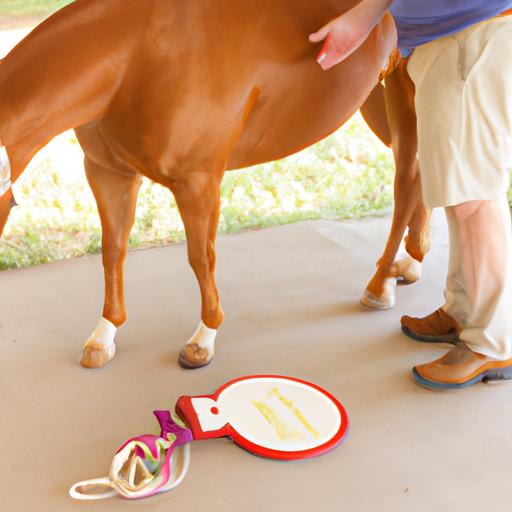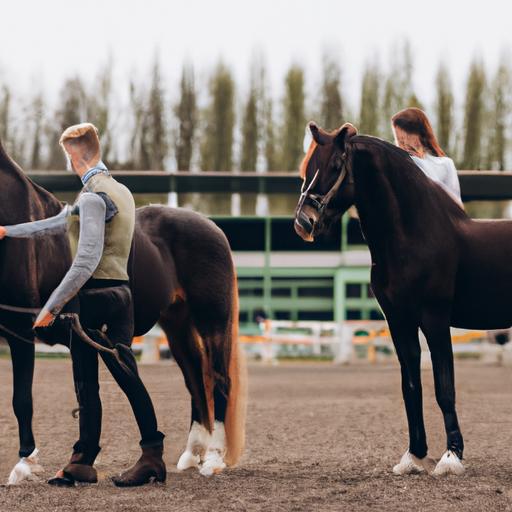Discover the importance of a horse training contract for a successful partnership. Learn about key elements and legal implications in our comprehensive guide.
Are you considering entrusting your beloved horse to a professional trainer? Embarking on this journey can be both exciting and nerve-wracking. After all, you want to ensure that your equine companion receives the best care and training possible. But how can you guarantee a successful and professional partnership? The answer lies in a well-crafted horse training contract.
Introduction

In the world of horse training, a contract serves as a crucial tool to establish clear expectations and responsibilities between the trainer and the horse owner. It not only safeguards your interests but also ensures the welfare of your horse. By outlining the terms of the agreement, a horse training contract acts as a roadmap for a harmonious partnership.
Now, you might wonder, what are the key elements that should be included in a horse training contract? Let’s take a closer look.
A horse training contract should begin with a comprehensive identification of all parties involved. This includes the trainer, the owner, and, of course, the horse. Clearly stating who is responsible for what sets the foundation for a transparent and accountable relationship.
Next, the duration and scope of the training services should be explicitly defined. Will your horse undergo a specific training program or receive ongoing training? By establishing clear timelines and objectives, you can ensure that both parties are on the same page regarding the training period.
When it comes to training methods and techniques, this section of the contract should outline the trainer’s approach. Do they rely on natural horsemanship methods or follow a specific discipline? Defining these details will help you find a trainer whose methods align with your horse’s needs and your personal preferences.
Additionally, the contract should outline the responsibilities and obligations of both the trainer and the owner. This may include provisions related to feed, veterinary care, and exercise routines. By clearly stating these expectations, you can ensure that your horse receives the necessary care and attention throughout the training period.
Lastly, the financial aspect is a crucial consideration. The contract should clearly outline payment terms, including the training fees and any additional expenses. By addressing these financial matters upfront, you can avoid any misunderstandings or disputes down the road.
In conclusion, a horse training contract plays a vital role in establishing a successful and professional partnership. By encompassing key elements like parties’ identification, duration and scope of training, methods and techniques, responsibilities, and payment terms, this agreement sets the stage for a harmonious relationship between the trainer and the horse owner. Stay tuned as we delve deeper into these components in the upcoming sections.
Remember, when it comes to horse training, a solid foundation is key. With a well-drafted contract, you can embark on this journey with confidence, knowing that you have taken the necessary steps to protect your horse and ensure a fruitful partnership.
Stay tuned for Section 2, where we will dive into the understanding of a horse training contract and explore its legal implications and benefits.
Understanding the Horse Training Contract

Definition and Purpose of a Horse Training Contract
When it comes to entrusting your horse to a professional trainer, a horse training contract serves as a crucial document to formalize the agreement between the parties involved. But what exactly is a horse training contract, and why is it necessary?
A horse training contract is a legally binding agreement that outlines the terms and conditions of the training services provided by the trainer. It serves as a roadmap for the training period, establishing clear expectations and responsibilities for both the trainer and the horse owner. By putting these terms in writing, the contract provides a solid foundation for a successful partnership.
Legal Implications and Benefits of Having a Written Agreement
Having a written horse training contract offers several legal implications and benefits that protect both the trainer and the owner. Let’s explore some of these advantages:
- Clarity and Avoidance of Misunderstandings: By clearly defining the terms and conditions of the training arrangement, a written contract helps prevent misunderstandings and disputes. It ensures that both parties have a shared understanding of their roles and responsibilities, reducing the likelihood of conflicts.
- Enforceability: A well-drafted contract provides legal protection to both the trainer and the owner. In the event of a breach of contract, having a written agreement allows the injured party to seek legal remedies and enforce the terms agreed upon.
- Liability and Risk Management: A horse training contract typically includes clauses related to liability and insurance coverage. By clearly stating the responsibilities and potential risks associated with the training, the contract helps protect both parties from unforeseen circumstances.
- Professionalism and Accountability: A written contract enhances the professionalism of the trainer-owner relationship. It demonstrates a commitment to transparency and accountability, fostering trust and confidence between both parties.
- Record-Keeping: Having a written agreement serves as a valuable record of the training arrangement. It documents the details of the partnership, including the duration, payment terms, and agreed-upon training methods. This record can be referred to in case of any future disputes or for reference purposes.
In conclusion, a horse training contract is not just a piece of paper, but a crucial tool in establishing a successful and professional partnership. By defining the terms and conditions, a written agreement provides clarity, legal protection, and accountability for both the trainer and the horse owner. In the next section, we will delve deeper into the key components that should be included in a horse training contract. Stay tuned!
Stay tuned for Section 3, where we will explore the key components of a horse training contract and discuss the importance of clear identification, duration and scope of training, training methods and techniques, responsibilities, payment terms, and liability coverage.
Key Components of a Horse Training Contract
When it comes to crafting a comprehensive horse training contract, certain key components must be included to ensure a clear and mutually beneficial agreement. Let’s explore these essential elements in detail.
Clear identification of the parties involved (trainer, owner, and horse)
The foundation of any effective contract lies in clearly identifying the parties involved. In this case, it means providing accurate and detailed information about the trainer, the owner, and, of course, the horse. Including full names, addresses, and contact information will help avoid any confusion or misunderstandings down the line.
Duration and scope of the training services
Defining the duration and scope of the training services is crucial to setting expectations for both the trainer and the owner. Specify the start and end dates of the training period, as well as the frequency and duration of sessions. This ensures that both parties are aware of the time commitment involved and allows for better planning.
Training methods and techniques to be used
Every trainer has their unique approach to horse training. It’s essential to outline the specific methods and techniques that will be employed during the training process. Whether it’s natural horsemanship, classical dressage, or a particular discipline, including these details in the contract ensures that the trainer’s methods align with your expectations and the well-being of your horse.
Responsibilities and obligations of both parties
Clearly defining the responsibilities and obligations of both the trainer and the owner is vital for a harmonious partnership. This section should outline the specific tasks and duties of each party. For example, the trainer may be responsible for feeding, grooming, and exercising the horse, while the owner may be in charge of providing necessary equipment and covering veterinary expenses. By clarifying these roles, potential conflicts can be avoided.
Payment terms and schedule
The financial aspect of the training agreement is a critical consideration for both parties. This section should clearly state the training fees, any additional costs, and the payment schedule. Be specific about the payment method, due dates, and any late fees or penalties. By addressing these financial matters upfront, both the trainer and the owner can ensure a transparent and fair arrangement.
Liability and insurance coverage
While we hope for smooth training experiences, it’s essential to address liability and insurance coverage in the contract. Outline the responsibilities and potential risks associated with the training process. Consider including clauses related to injury or damage to the horse, trainer, or owner’s property. Additionally, ensure that both parties have appropriate insurance coverage to protect against unforeseen circumstances.
By incorporating these key components into your horse training contract, you can establish a solid foundation for a successful and professional partnership. Join us in the next section, where we will delve into the process of drafting an effective horse training contract, offering valuable tips and insights to ensure that your agreement meets your specific needs and circumstances.
Drafting an Effective Horse Training Contract
Importance of Customizing the Contract
When it comes to drafting a horse training contract, one size does not fit all. Each partnership is unique, with individual needs and circumstances. Therefore, it is crucial to customize the contract to ensure it accurately reflects the expectations and requirements of both the trainer and the owner.
By tailoring the contract to your specific situation, you can address any particular concerns or preferences. This customization ensures that the agreement aligns with your goals for your horse’s training and provides a solid foundation for a successful partnership.
Tips for Protecting Both Parties’ Interests
To protect the interests of both the trainer and the owner, it is important to include specific clauses in the horse training contract. These clauses can outline rights, responsibilities, and potential scenarios that may arise during the training period. Here are some key tips to consider:
- Liability and Insurance Coverage: Clearly define the liability of each party in case of accidents, injuries, or damages that may occur during the training. Additionally, ensure that adequate insurance coverage is in place to protect both the trainer and the owner.
- Cancellation and Termination: Include provisions that outline the process for cancellation or termination of the contract. This can include notice periods, fees, and any other relevant details to protect the interests of both parties.
- Dispute Resolution: Consider including a clause that outlines the procedure for resolving disputes, such as mediation or arbitration. This can help avoid costly and time-consuming legal battles and promote a more amicable resolution.
- Ownership and Transfer of Horse: If there are any specific terms regarding the ownership of the horse or potential transfer of ownership during or after the training, these should be clearly stated in the contract.
By incorporating these specific clauses, you can safeguard the interests of both the trainer and the owner, providing clarity and protection in various situations that may arise.
Common Pitfalls to Avoid
Drafting a horse training contract can be complex, and there are several common pitfalls to be aware of. Avoiding these pitfalls can help ensure that your contract is comprehensive and effective. Here are a few to watch out for:
- Ambiguity: Be clear and concise in your contract language to avoid any misunderstandings or misinterpretations. Ambiguity can lead to disputes and complications down the line.
- Omission of Key Details: Ensure that all relevant details are included in the contract. Don’t overlook important aspects such as payment terms, training schedules, or specific expectations.
- Failure to Seek Legal Advice: While you can draft your own contract, it is highly recommended to seek legal advice to ensure that your agreement is legally sound and covers all necessary aspects.
By being mindful of these common pitfalls and taking the necessary precautions, you can draft an effective horse training contract that protects the interests of both parties and sets the stage for a successful partnership.
Stay tuned for Section 5, where we will explore the steps to enforce a horse training contract and the legal remedies available in case of breach.
Enforcing the Horse Training Contract
Steps to Ensure Compliance and Prevent Disputes
Once you have established a horse training contract, it is essential to take proactive measures to ensure compliance and prevent potential disputes during the training period. By following these steps, you can maintain a harmonious relationship with your trainer and safeguard the well-being of your horse.
1. Clear Communication: Open and transparent communication is the foundation of any successful partnership. Regularly communicate with your trainer to discuss your horse’s progress, address any concerns, and ensure that both parties are aligned with the agreed-upon training plan. By fostering a culture of communication, you can mitigate misunderstandings and maintain a positive working relationship.
2. Periodic Evaluations: Conduct periodic evaluations to assess the training progress and identify any areas that may need adjustment. This allows you to stay informed about your horse’s development and ensure that the training is aligned with your goals. Regular evaluations provide an opportunity to address any issues promptly and make necessary modifications to the training program.
3. Timely Payment: Honor your financial obligations by making timely payments as outlined in the contract. By fulfilling your payment responsibilities promptly, you demonstrate your commitment to the partnership and foster trust with your trainer. Timely payments also contribute to a positive working relationship and reduce the likelihood of disputes arising from financial matters.
Legal Remedies in Case of Breach of Contract
Despite your best efforts to maintain a smooth partnership, disputes may occasionally arise. In the event of a breach of contract, it is important to be aware of your legal remedies to protect your interests. Here are some options to consider:
1. Review the Contract: Thoroughly review the terms and conditions of the contract to determine if there has been a breach. Identify the specific provision that has been violated and gather any evidence that supports your claim.
2. Communicate and Seek Resolution: Initiate a conversation with your trainer to discuss the issue and attempt to resolve the dispute amicably. Open communication can often lead to a mutually beneficial resolution and preserve the partnership.
3. Mediation: If direct communication does not yield a satisfactory outcome, consider engaging in mediation. Mediation involves a neutral third party who facilitates discussions between the involved parties with the goal of reaching a mutually acceptable resolution. Mediation can be a cost-effective and efficient alternative to litigation.
Arbitration as an Alternative Dispute Resolution Method
In cases where mediation fails to resolve the dispute, arbitration can provide a more structured alternative to traditional court proceedings. Arbitration involves presenting the dispute to an impartial arbitrator or a panel of arbitrators who will make a binding decision. This process can be faster and less formal than litigation, potentially saving both time and money.
In conclusion, enforcing a horse training contract requires proactive steps to ensure compliance, prevent disputes, and protect your interests. By maintaining clear communication, conducting periodic evaluations, and honoring your financial obligations, you can foster a successful partnership with your trainer. In the event of a breach, reviewing the contract, seeking resolution through communication or mediation, and considering arbitration can help resolve disputes efficiently and effectively.
Stay tuned for Section 6, where we will wrap up our discussion on horse training contracts and provide a comprehensive conclusion to our exploration.
Remember, a well-enforced contract is the cornerstone of a successful and professional horse training partnership.


